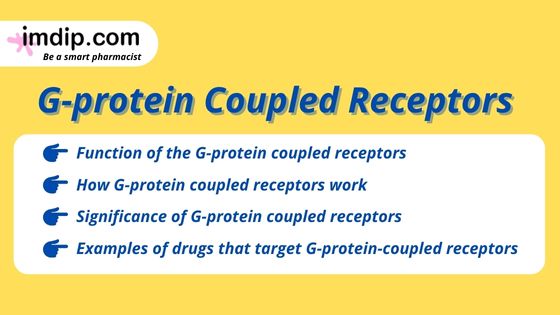
G-protein coupled receptors are a type of transmembrane protein that is involved in a wide range of biological processes. The name G-protein comes from guanine nucleotide-binding protein. They are one of the most important and extensively studied classes of receptors in the human body and are the target of many drugs and pharmaceuticals. In this article, we will explore their function, how they work, and their significance in modern medicine.
The function of the G-protein coupled receptors:
The primary function of G-protein coupled receptors is to transmit signals from the external environment into the interior of the cell. They do this by binding to specific ligands, such as hormones, neurotransmitters, or other signaling molecules. When a ligand binds to the receptor, it induces a conformational change in the receptor, which then activates a G protein.How G-protein coupled receptors work:
G-protein coupled receptors are made up of seven transmembrane helices that span the cell membrane. The N-terminus of the receptor is located outside the cell, while the C-terminus is located inside the cell. When a ligand binds to the receptor, it induces a conformational change in the receptor that causes it to activate a G protein.G proteins are composed of three subunits: alpha, beta, and gamma. When the receptor is activated, the alpha subunit dissociates from the beta-gamma subunit and binds to a downstream effector protein. This activates a signaling pathway that ultimately leads to a cellular response.
Significance of G-protein coupled receptors in modern-day medicines:
G-protein coupled receptors are a major target of drugs and pharmaceuticals, as they play a crucial role in many physiological processes. In fact, it is estimated that approximately 30-40% of all pharmaceutical drugs target it.Some examples of drugs that target G-protein coupled receptors include:
- Beta-blockers: Used to treat hypertension and other cardiovascular diseases, beta blockers target the beta-adrenergic receptor.
- Antihistamines: Used to treat allergies and other conditions, antihistamines target the histamine receptor.
- Antipsychotics: Used to treat schizophrenia and other psychiatric disorders, antipsychotics target dopamine and serotonin receptors.
In addition to their role in drug development, G-protein coupled receptors also have important implications for basic science and research. By studying its function, researchers can gain a better understanding of how cells communicate with each other and how physiological processes are regulated.
Hope you clearly understand G-protein coupled receptors and their function.












.png)
